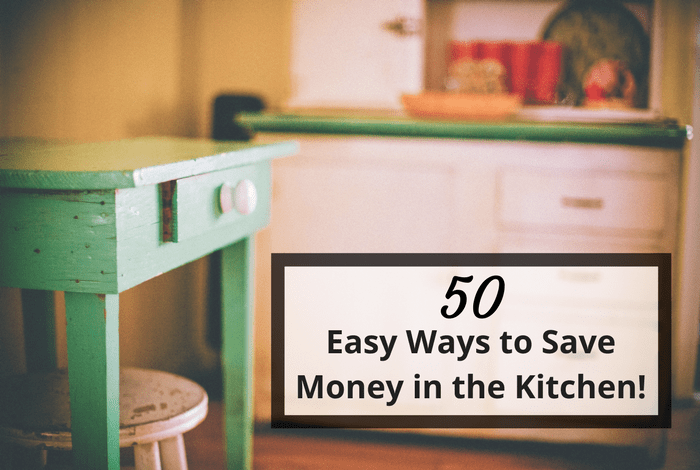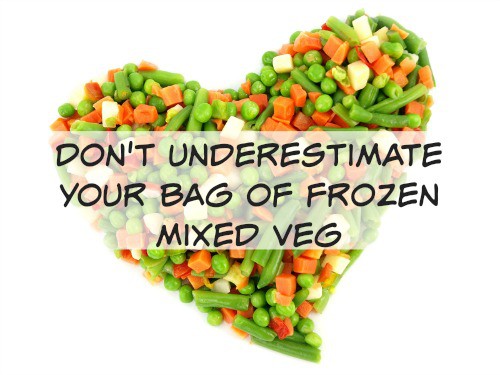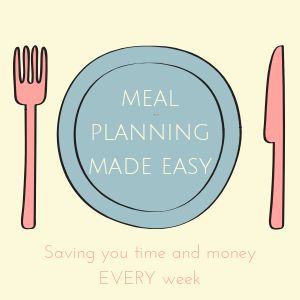Warning: these are not innovative new ideas to save money in the kitchen! They’re things that your common sense tells you that you should be doing but I can practically guarantee that you won’t be doing most of them…

50 Common Sense tips to help you save money in the kitchen!
Make sure you have a weekly shopping budget and that you stick to it. I worked mine out originally by looking at my receipts to see how much I spent in a week and then taking 10% off that. It’s been a work in progress since but we’re definitely saving.
Don’t buy pre-peeled / chopped fruit and vegetables as they almost always work out more expensive per kg.
While we’re on that subject – loose fruit and veg is usually cheaper than the stuff already packed in bags if you compare the price per kg and you can get just the right amount rather than have leftovers.
Cooking from scratch isn’t always cheaper – sometimes you might spend a small fortune on the things you need for a recipe when there’s a packet mix that will do the job AND save you time.
Buying larger packs of things usually offers a saving if you compare it with smaller packs.
Take advantage of 3 for 2 and other bulk buy deals.
You can often get fruit and veg cheap at the supermarket when they start reducing their prices on a night so a couple of trips a week could mean a seriously reduced weekly spend on fruit and veg.

We have frozen veg in for when we don’t get it reduced or we don’t have time to nip to the shop.
Bread is another thing that is very often cheap – we buy it and freeze it.
Cheese is something I regularly see reduced so I often buy it and then grate it when I get home and pop it in the freezer. It’s really only good for cooking at that point in my opinion though so I wouldn’t pop it in a sandwich.
Aldi is great for fruit and veg with their Super Six weekly deals.
Plan your weekly menu based on the food you have in the house to use up.
Shop online where possible as it’s easier to resist temptation and where you do see a good deal on something you can readjust your meal plan.
Keep your meal plan on display so everyone knows what’s for tea, you could even make a wall planner to keep track of your meal plans.
Use your slow cooker as much as you can – it saves time and money.
If you are using your slow cooker, try buying cheaper cuts of meat as the longer cooking time means that even cheaper cuts of meat are tender and delicious when they’re done.
Try batch cooking so you have meals in your freezer ready to go.
Freeze your leftovers in single portions and once a week/fortnight have a bit of a pot luck night where everyone gets a leftovers meal.
Cook double and change what you’ve cooked up a bit to serve the following night- bolognaise can be easily turned into chilli or lasagne and mince can easily be turned into cottage pie or even just a normal pie.
Bulk up your meals with things like pasta, rice, veg, lentils or potatoes so they go further.
Even if you’re not a vegetarian, have a couple of veggie meals each week as they’re often cheaper and they’re just as tasty.
Read Supermarket free magazines for inspiration and for the free vouchers you often find in there.
For every brand product, you’ll usually find a supermarket own brand and a value version. If you buy the branded product, try the own brand next time and if you already buy the own brand then try the value version. You’ll be surprised!

Packed lunches always work out cheaper for us.
Don’t be afraid to adapt recipes you find online (by adapt I mean leave out the most expensive ingredients ;-)) You can replace King Prawns with normal sized ones or leave them out completely like I often do when I make chicken and King Prawn Chorizo.
Look for alternatives – turkey is cheaper than chicken for example.
Freeze stale bread to make breadcrumbs.
Don’t throw out what’s left in your fridge at the end of the week – use it up in a recipe like fridge bottom frittata, whizz any veg up into soup or even make it all into a stir fry!
Learn to be more innovative with leftovers – Risotto balls and macaroni cheese burgers have both been triumphs this year here!
Keep on top of the use by dates on the food in your fridge and make sure your meal plan will mean food is used before that date. If things change, remember to freeze food before it’s unsafe.

On that note, make sure you know the difference between ‘best before’ and ‘use by’ dates.
Whenever you see pastry in the reduced section – buy it! I have ready made pastry in my freezer that I just need to defrost in the fridge overnight and add to leftovers to make it into a pie.
Make snacks rather than buy them.
Hide snacks from the family if they’re likely to eat them all in one go.
Buy cheaper butter / margarine for baking rather than use the same one you normally use.

As much as I love Aunt Bessie, you can make your own Yorkshire Puds so much cheaper and they taste so much nicer.
The same doesn’t always go for mash because when you can buy a good sized bag of mash for 75p – £1 then that works out at a good deal if you like the taste.
Frozen fruit can often work out to be great value if you have a smoothie fan in the house like we do.
Try shopping online at somewhere like Approved foods.
Have a week every now and again where you use up everything that you have in – you’ll have some odd meals but you’ll save lots but it’ll clear out all your leftovers and reduced bargains ready to start again.

If a kitchen appliance like your microwave breaks, ask yourself if you really need to replace it.
Encourage the family to drink more water – even if this means investing in a filter jug to go in the fridge. Miss Frugal loves water and rarely drinks anything else but I’m still working on her brother.
Only boiling as much water as you actually need can save up to £7 a year. Small but better in your pocket surely?
Consider if you really need that shiny new gadget you’ve got your eye on! I’m really bad for this but most things I have my eye on aren’t particularly necessary and will probably just end up gathering dust in the garage.
And along the same lines as gadgets, I’m pretty sure you don’t need that new cookbook that you want. The chances are that you’re just going to look at the pictures and wish you could make food like that. Your best bet is the internet where there are millions of free recipes at your disposal.
Throw away every single takeaway menu that is pushed through your door as they might be too tempting after a long day.
I’m classing laundry machine money saving as kitchen money saving as most people have their machine in the kitchen, right?
If you wash at 30 degrees you will use 40% less energy per cycle and a lot of washing powders these days are designed with this temperature in mind.
You don’t have to use the recommended amount of washing detergent to get good results – I use about two thirds.
Make sure you keep your machine clean to keep it running as efficiently as possible.

Tumble dryers, especially older models can eat money and can cost over £100 a year to run so my best advice would be not to use it at all. If that’s not an option then at least only use it when you absolutely have to. Dry your washing outside wherever possible to save money – I have an airer that I dry my clothes on inside the house when it’s not possible to dry outside as we got rid of our tumble drier when we moved house to save money.
If you are looking to replace any appliances in the kitchen then do shop around and try and use cashback websites when you make your purchase.
Make sure that you check the energy efficiency rating on the appliance to make sure that it’s not going to cost you a fortune to run.
Can you think of any that I’ve missed?
Don’t miss out on future posts like this – receive updates directly to your inbox by email by adding your email address here and hitting subscribe. You can also follow me on Twitter, BlogLovin or Networked Blogs and I’d love to see you over on my Facebook page and on Instagram.











This is extremely helpful for those looking to save a few dollars in today’s costly shopping environment. Thanks for collecting these tips, they’ll definitely help my family save, and we can then use those savings elsewhere.
I like it
Very true about cooking from scratch not being the cheapest way. To be honest, I find stocking up at Iceland regularly saves me quite a lot of money. I know it saves money but I just cannot bring myself to ditch my tumble dryer it is too much of a time saver. Will have to economise in other ways.
Gotta try out these tips! I heard of these tips before (most of them), but I haven't got the chance to try it out. Now is the time. Thanks!
Wow! I never knew that these tips work especially the freezing part! Great tips! Shared!
Whoops!
http://www.keepcalmandcoupon.com/50-bad-habits-co…
I love these!
How about these (50) bad habits that may be costing your readers thousands each year.
The frozen veg tip alone has saved me £££!